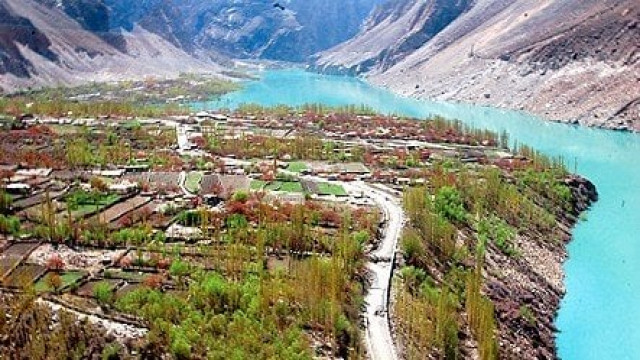Attabad: out of sight, out of mind
The breathless reporting out of Attabad has almost stopped.

Attabad: out of sight, out of mind
The January 14 earthquake unleashed hell on Attabad village situated on the banks of the Hunza river. A gigantic landslide blocked the river, fed by melting glaciers. And the slowly surging water submerged five villages upstream, killing 20 people and scores of cattle and damaging the strategic Karakoram Highway at several places. The lake did not catch the attention of the ubiquitous electronic media until it turned into a ticking “water bomb”, with experts warning of a catastrophe in downstream villages if the lake burst its banks. Authorities swung into action, several vulnerable villages were evacuated and residents were housed in shelter camps on higher ground. Anybody and everybody in Pakistani politics visited the region, at least for photo ops. The issue fed headline-hungry newspapers and footage-savvy TV channels for some time. But the inevitable didn’t happen. And a disappointed media turned its focus back to the “most interesting topic”: politics.
Last month, engineers managed to dig a crude spillway into the swelling lake in an attempt to drain out water. But it made little difference, much to the dismay of the affected people. Running out of options, the authorities quietly decided to assign thousands of poor souls to their fate in shelter camps. Frustrated by this apathy of the government, the affected villagers resorted to protests. A senior government official brushed aside these protests saying, “A handful of young men are inciting the affected people to trouble.” These people have already rejected cash compensation announced by Prime Minister Yousaf Raza Gilani as “peanuts.” But the chief minister of Giligit-Baltistan has said his government can’t give more. “We have done whatever we could. We don’t have funds to give them more,” Mehdi Shah said last week, putting a full stop to further debate on the issue.
In the meantime, the popular Shandur polo festival provided the regional government with a God-sent opportunity to divert people’s attention from the Attabad issue. It decided to boycott the British-era festival, objecting to the Khyber-Pakhtunkhwa government’s right to organise the sporting event in Shandur which, it claims, is not part of that province. A new geographical controversy, sparked by the boycott decision, has apparently taken the spotlight off the plight of the lake victims, at least for now.
While a human catastrophe is still staring us in the face, the Attabad issue is sliding down the priority list of the media. And our political leaders have found so many other “pressing” issues that they can’t spare time for the lingering crisis in far-off Attabad.
Published in The Express Tribune, July 19th, 2010.



















COMMENTS
Comments are moderated and generally will be posted if they are on-topic and not abusive.
For more information, please see our Comments FAQ